“It is a strange fate that we should suffer so much fear and doubt over such a small thing.”
– Boromir
The Lord of the Rings
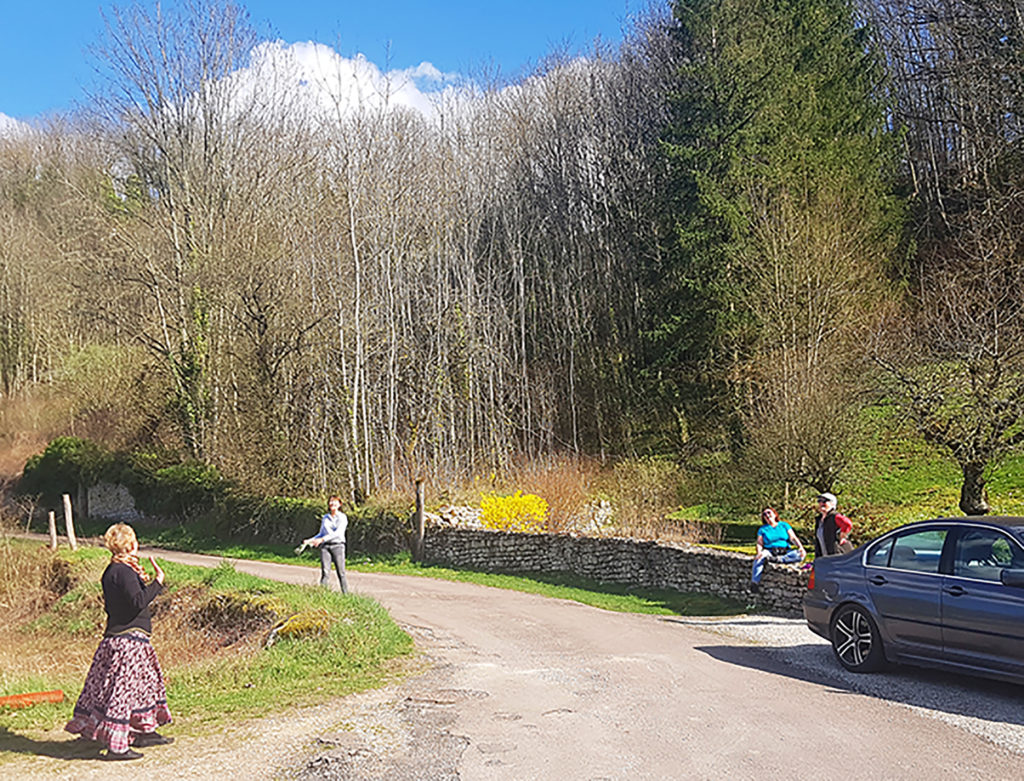
When the plague reached Paris in 1348, anyone who could afford to flee the city to the safety of the countryside did so immediately. It was with that historical fact in mind that we noted this week the arrival of many of the part-time inhabitants of Flavigny who live and work in Paris, but were chased out of the city by a microscopic virus just 120 nanometers across. They left Paris in force, just before President Macron’s unprecedented, Italian-style lockdown of daily life went into effect all across France on Tuesday at noon.
But even though we know all of our friends and neighbors are here, by the density of cars in the village, we don’t usually see them. People are following the rules and staying off the streets, unless it is to head out for walks in the remote countryside, or to work in their gardens. So Flavigny feels full, like it’s summer, and at the same time empty, like in the winter. That’s when the population diminishes considerably as the ceaseless gray, cold rains move in, leaving only the hard-core French Flavigniens (plus two crazy Americans who came here a few years ago, and won’t leave.)
On the morning of the lockdown, we found ourselves racing the noon deadline on an hour-long drive to Dijon. I had realized Monday night that my son’s credit card and health insurance ID were sitting on my kitchen counter, and he was in Phnom Penh, Cambodia. Suddenly it seemed like a very bad time in the world for Brendan to be without a valid credit card and health insurance card.
The drive from our home to Dijon runs through the Oze River Valley, a landscape of breathtaking beauty that is typical of the Cote d’Or hills that surround our home. And when you drive through the countryside during a time of unprecedented global strife, you can’t help but get a little philosophical. As we wound our way down the valley, Paula and I found ourselves talking about the impermanence of humans against the permanence of nature.
I mentioned the classic George Carlin stand-up routine, in which he mocks the “Save the Planet” movement. In Carlin’s telling, the planet has withstood immense earthquakes, tectonic shifts, magnetic storms, ice ages, millions of years of explosive volcanoes and massive collisions by giant asteroids, comets and meteors. Carlin mocks the arrogance of human beings, who have been around for the blink of an eye. For the planet, human beings would be a minor inconvenience, brushed away like a “bad case of fleas.” The planet is going to be fine; It’s the humans who are screwed, he says.
Then Carlin delivers the coup de grace of his rant, suggesting that when the planet is ready to defend itself, it will simply send in the viruses to take care of us, and cleanse itself of our scarcely noticed time on earth.
It’s frighteningly prescient, and yes, a bit dark. But this highway rumination wasn’t nearly as dark as that, because I was led to one inescapable conclusion: Beauty endures.
I know that the beauty of this countryside is not dependent upon the two of us, or any other human being, passing through it and seeing it. It simply is a beautiful place. It was beautiful before we were here, and will be after we’re gone. And somehow that knowledge – or maybe it’s more like a belief – that beauty endures with or without us, made me calmer about the brutal, deadly battle that lies ahead for humanity.
Anyway, when we arrived at the FedEx office, I took a rubber glove from the box we now carry in the car and put it on my right hand, and we walked to the door. A fresh sign said only one person at a time would be allowed inside.
But we weren’t even allowed inside. When we rang the buzzer, a woman opened a window to the right of the door, an opening encased in iron bars. We stood on opposite sides, unsure which of us was in prison and which was free. I explained our purpose, and she stretched out her hand. I did the same with my gloved hand, cautiously placing the envelope and airbill in her outstretched hand, the two of us never breaking the required two-meter minimum on human interaction. She checked everything, declared all in order, and we were on our way.
On the drive home, I thought about how incredibly fortunate we are. We were about to go into lockdown, far from large populations, but close to essential services, in a village we love, set amid a breathtakingly beautiful countryside, on the cusp of spring. We no longer rely on jobs for income. And we have enough food and wine to last us a month. We are going to be OK.
But that doesn’t mean the pandemic is far away. And one of the things we love about living in Flavigny is how big our social life is here. So the adjustment to avoidance is not an easy thing. I’m glad we have each other, and that we have years of practice spending nearly every hour together. Not everybody has someone with whom they’re happy to ride out a pandemic.
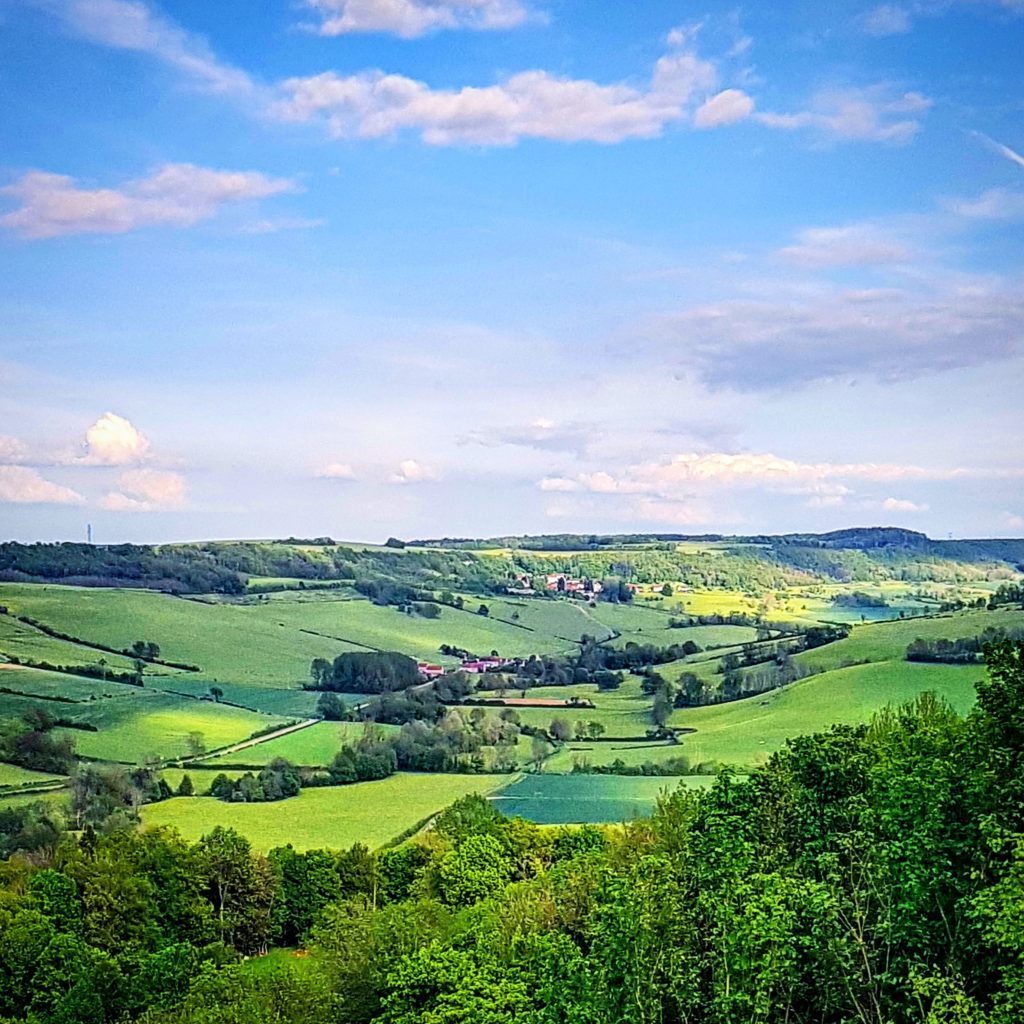
As if to cash in on our good fortune, after lunch that day, we took a long, slow walk, winding down the path that leads from the Poterne Gate down to one of the valleys below the village. At this time of year, a small brook runs down the center of the valley, and you can hear the soothing sound of rushing water while you’re still descending the hillside, along an old stretch of the monastery wall. We walked along the creek, then began a steady climb up through the forest. At the top, we U-turned out onto the wide-open plateau, with broad fields and farms interspersed among stands of old forest. A lone farmer on a tractor in the distance was plowing his field, preparing it for the spring planting.
By the time we arrived back in the village two hours later, our neighbor André stopped us to tell us that while we were gone, the world had changed. We were now required to carry with us at all times an “attestation,” basically a signed statement with name, address, and date of birth, that stated our reason for being out of our house. Failure to carry the attestation, or to be engaged in whatever it said you were engaged in, could result in fines up to 135€.
Right now, there are only 5 reasons to be out of your house in France: 1. To go to the grocery store, bakery, or pharmacy (everything else is closed.) 2. To get exercise or engage in an outdoor activity like gardening, but not by playing team sports, and not with others, and not in a gym (also closed). 3. To go to the doctor. 4. To check on an elderly relative or friend. And 5. To go to work at a job where telecommuting is not possible, like doctor, or nurse.
Or grocery store cashier. Strange times.
Oh yeah: No. 1 includes the fact that you can also buy lottery tickets and cigarettes at the local Tabac. Now some people in America find this absurd. But we can tell you after more than two years in France, nobody wants to ride out a pandemic with a bunch of Frenchmen who can’t smoke. Some things are more frightening than a deadly virus.
Meanwhile, at the bottom of the hill at the big modern Super U grocery store in Venarey, word on the street was that the gendarmes were out in force, letting only 10 people into the store at a time (100 is probably normal), and checking for attestations at the door. They seem pretty serious.
In the provinces, the coronavirus has actually stripped our life down to its essentials. Before the pandemic came along, we would invariably wake up under our attic skylight, look at the clouds, and plan a day full of errands and tasks we were convinced we needed to complete.
Now, we focus on only one thing: what can we do today to stay healthy? Get some exercise, spend some time in nature, take long walks, do some gardening, eat well, try to get good sleep, live in gratitude every moment. With hospitals overrun with deathly ill patients, you have to do everything in your power to avoid needing to go to the doctor. Because the sobering truth is that there may not be one available to treat you for a while.
Sometimes – usually at breakfast while listening to a particular song – one or the other of us will be overcome with the emotion of the moment we are living in. We’ve read so many accounts of heartbreak, suffering and desperation, in China, in Italy, in France, and now just starting in America, that sometimes the weight of it is overwhelming. So much pain in the world right now. In those moments, we just hold onto each other, until the storm passes. Living in beauty and hope is a choice, but it’s not always easy.
While we’re weeping into our eggs, Bénédicte is up the hill at the épicerie each morning, obsessively disinfecting everything in the shop, including both sides of the door handle every time someone enters or leaves, and the card machine every time someone pays with a credit card. People in the store keep a legal distance between each other as they peruse the tiny space for essentials. It’s a blessing to have the shop in the village at a time like this, as the Super U presents a lot more people and surfaces (and cops!) that could carry infection.
Béné was supposed to retire at the end of the month, and sell the shop. But the buyers, and the real estate agents, and the notaires, and just about anyone else involved in a possible transaction, are prohibited from working now. So Béné will keep working, a member of a new first responder category in a world gone mad. Which is good, because the town needs her now, maybe more than ever. She’s earned her rest, but it looks like a long, hard summer ahead.
It is in the gardens alone where you get a sense that there are more people in town than usual. Like most medieval villages, the bulk of the gardens for citizens of Flavigny are outside the old ramparts, stretched out in a stone-walled grid west of the city.
Every plot seems busy, and we wave hello, from well beyond safe distance, to many villagers, some known and some strangers to us, all of us hunkered down weeding and planting within our own stone walls, but all bound together by this bizarre global tragedy.
Our sizeable plot is close to one of the town’s main entrances, and since we arrived 30 months ago, it has been a jungle. But we’ve made a point this year of trying to get it into shape. Perhaps in the back of our minds, the need to be able to grow our own food suddenly became much more important.
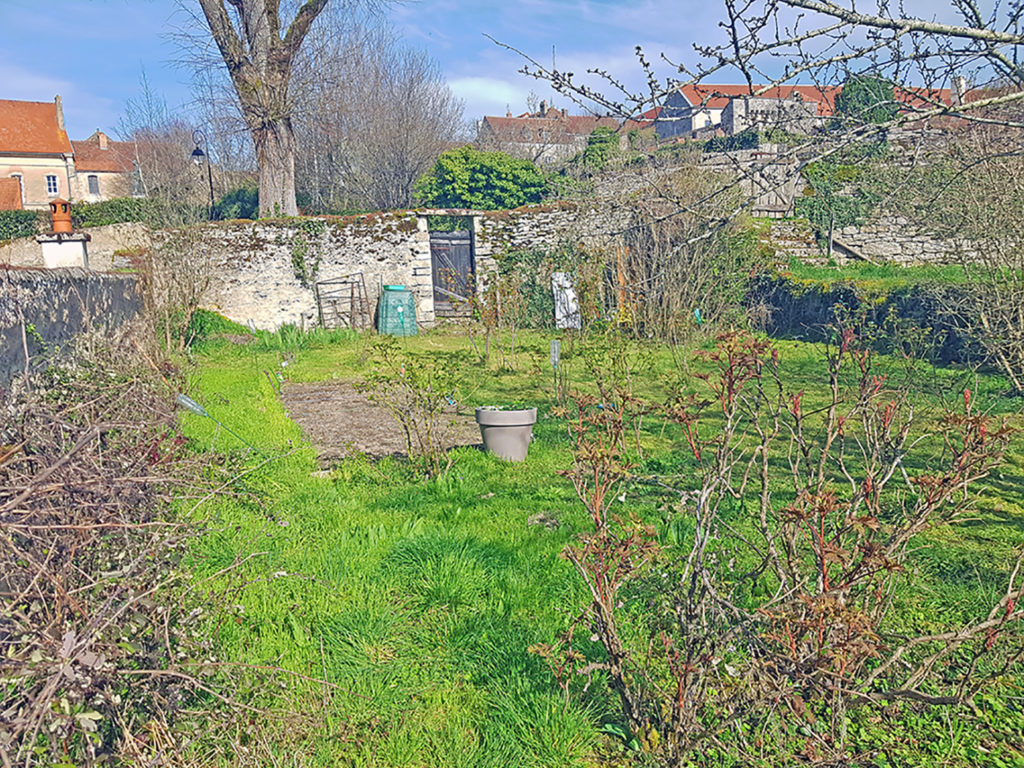
We are greatly aided this year, not only in the garden but also emotionally, by the companionable presence of our friend Maud, an American medievalist college professor whose father Virgil was the first foreigner to buy a house in Flavigny. Maud went to school here as a child, speaks fluent French and knows an amazing number of fantastic stories about village life. (“I got appendicitis in that house.”)
She decided this year, of all years, to take a sabbatical to come stay at her family home (now hers) in Flavigny, and finish a book she’s been writing. Now she’s trapped here, which is great for her – the French countryside is a much safer place to ride out the pandemic than a college campus in suburban Philadelphia – and also terrible for her, as her two grown children are back in the States, and if she needed to get to them, she could not.
So everyone’s trying to make sure she doesn’t need to. Her kids are being studious about sheltering in place, and reassuring her that everything’s going to be OK. She’s being exceedingly cautious, and the three of us have formed a little plague circle here in the countryside. Still, it’s stressful enough that one seeks refuge where one can.
Nearly every afternoon the three of us meet in the garden. I should confess that Paula and I are terrible gardeners – or rather, it’s probably more accurate to say we are inexperienced gardeners. Wil and John, the previous owners of our house, kept up a great garden, but they moved to Barcelona a couple of years before we came along, so our walled plot on the edge of town, all 2,500 square feet of it, had gone completely wild.
Blessings arrived last summer, in the form of Maud and her friend Michael, a landscaper who came for several weeks and wanted a “project.” Boy, did we have a project.
Maud and Michael spent weeks clearing out our wreck of a garden. The worst of it was the explosion of wild blackberry plants that had taken over the back half of the garden. Michael tackled the daunting briar patch, and pulled about 95 percent of it out.
Some of you reading this are no doubt thinking how much you love blackberries. But let me just say two things. The first is that wild blackberries grow like mad around here in the wild. Thus the name. So you don’t need them in your garden. And second, with thorns that easily penetrate even the thickest leather gloves, and roots that reach to the center of the earth, wild blackberry plants are – and I don’t want to overstate this in any way – the devil’s spawn. I spend all of my time in the garden wrestling the 5 percent of blackberry plants Michael left behind. God, I hate those things.
Maud has taken over a chunk of dirt that is prepped for vegetables. Already, lettuce, carrots, radishes, and strawberries are taking root. Cucumbers, tomatoes, onions, and zucchini are coming.
There are also seven rose bushes left over from when Wil ran a bed-and-breakfast in town, and used the roses to decorate the breakfast tables. I used to grow roses, so I’m very happy to be at it again, and I love how the flowers make our house a sunnier place.
But the thing that Paula and I are most excited about is a plot of land along the southern wall where, last winter, we established a small pet cemetery as the final resting place for our dog Bear, and our cat Rex Ryan. We brought both of them with us to France, but we knew Bear, at 16, wouldn’t last long. Five months after we arrived, he died. We were more shocked when Rex Ryan, a young and vital cat, died six months later, of a congenital heart defect.
This winter, on a trip to the Netherlands, we bought 50 tulip bulbs. And on a gray winter day, we planted all of them in the cold dirt above our pets. On Monday, we checked out the gravesite, and spied the telltale green shoots of a host of tulips, pushing their way through the dirt.
For us inexperienced gardeners, it felt like magic. As we looked on our little plot with pride, it occurred to us: Yes, there is great sadness and trouble in the world right now. But if we persevere, and do our best, and plant kindness and care, and weed out suspicion and fear, and have faith in our fellow humans, then a day will come when the world seems renewed, and once again looks beautiful.
And on that day, we will celebrate.

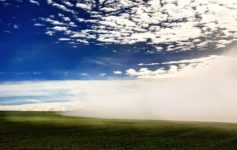
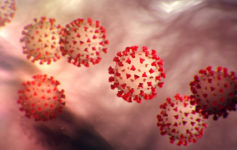
Your very best. It leaves me with tears that want to be shed and yet I resist. All because of your words and my lovely memories of Flavigny and the strange world we are living in while everything around us is budding and shouting spring. I love that you hold on to each other at breakfast. I love that you are with Maud who so kindly translated for me at the festival and fed me a great dinner and introduced me to Loki. I love that you are finding beauty in the earth and hope in your garden. . . despite the wild blackberries. May we all vanquish the wild blackberries of this pestilence
Nice work. Don’t fret about the coronavirus. This time next year you’ll be looking back and wondering why there was so much hysteria. Saludos from Mexico.